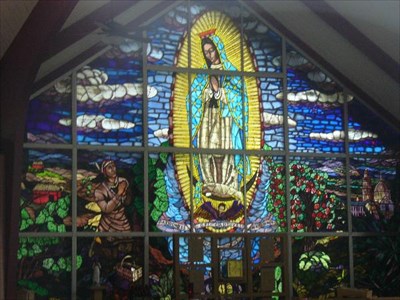He has shown the strength of his arm,
and has scattered the proud in their conceit.
He has cast down the mighty from their thrones
and has lifted up the lowly.
He has filled the hungry with good things,
and the rich he has sent away empty.
 |
| "Patroness of Captive Nations" |
During the past three years we have watched a chthonic movement of anger surface from both right and left ends of the political spectrum. The Tea Party movement and the Occupy movement have claimed to represent the real people, the overburdened middle classes and the forgotten underclasses. The response, inadequate but not without effect, has insisted there are no classes in America and claims class oppression and class warfare are suspiciously un-American.
They identify class struggle with Karl Marx and would purge our language of his insights. But other philosophers claim that since Communism has been both defeated and disgraced we can finally begin to examine Marxist thought more dispassionately. Perhaps he was onto something as he identified the ways in which the powerful manipulate "the System" to keep themselves in power.
The Bible never speaks of classes: rich, poor or middle. But it knows injustice, which begins with infidelity to God and appears as severe inequity between the rich and poor. Saint Luke's Gospel seems especially aware of the gap between the rich and poor. Where Matthew's Jesus blesses the "poor in spirit," (Matt 5:3) Luke's Jesus simply blesses the poor (Luke 6:20). The unbridgeable gulf between the rich man and Lazarus was set not by God but by the unfortunate rich man who languishes in parched torment. The story ends with his profound, intractable ignorance of God's ways and his endless, unmitigated suffering. (Luke 16:14-24) Yes, Virginia, there really is a Hell.
Mary's Magnificat, from Saint Luke's Gospel, also celebrates God's preference for the lowly, hungry and despised. It describes a young woman, invisible to Roman and Jewish authorities, who sings for joy at the irresistible advance of God's just mercy and merciful justice.
Despite the restricting control of many authorities, Mary still speaks to the poor, disenchanted and disenfranchised. I remember my own shock when I visited the Catholic Church in Cherokee, North Carolina and saw a stained glass window with Our Lady of Guadalupe and her title, "Patroness of Captive Nations." (I've linked a photo to this page.)
This unrest is embedded deeply in our religion. Although it has political and economic significance, it is essentially spiritual. God will never let Christians be satisfied with the way things are in our world; he will remind us continually that our systems have forgotten someone.
So long as there is sin there is injustice and only the Mercy of God can deliver us. But even that formula cannot excuse our inaction. We can only hope that our prayers with Mary for the coming of the Savior will liberate us from our privileges and lead us in her impoverished path of joyful freedom.
So long as there is sin there is injustice and only the Mercy of God can deliver us. But even that formula cannot excuse our inaction. We can only hope that our prayers with Mary for the coming of the Savior will liberate us from our privileges and lead us in her impoverished path of joyful freedom.
No comments:
Post a Comment
I love to write. This blog helps me to meditate on the Word of God, and I hope to make some contribution to our contemplations of God's Mighty Works.
Ordinarily, I write these reflections two or three weeks in advance of their publication. I do not intend to comment on current events.
I understand many people prefer gender-neutral references to "God." I don't disagree with them but find that language impersonal, unappealing and tasteless. When I refer to "God" I think of the One whom Jesus called "Abba" and "Father", and I would not attempt to improve on Jesus' language.
You're welcome to add a thought or raise a question.